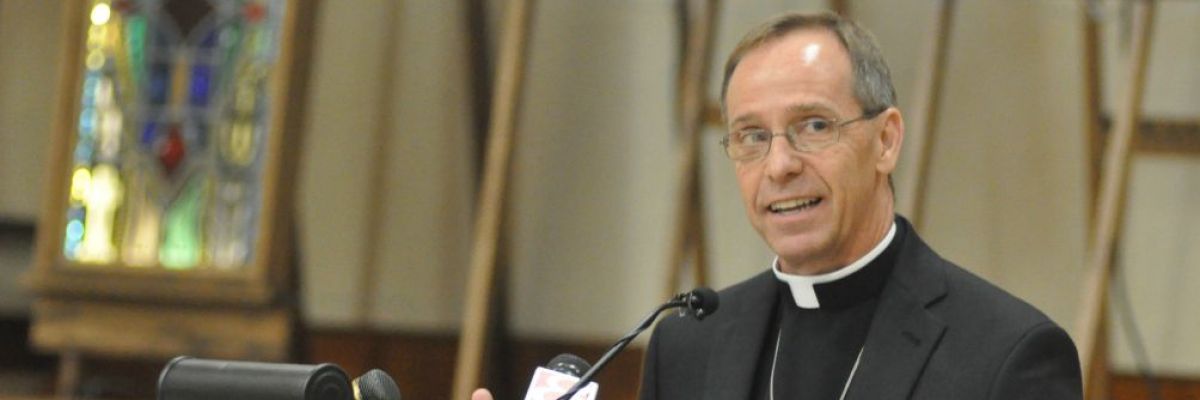
Kudos to Archbishop Charles Thompson of Indianapolis for his faithful witness in revoking the Catholic status of Brebeuf Jesuit Preparatory School (BJPS), when the school chose to renew the contract of a teacher in a same-sex “marriage.” The archbishop’s decision, made during “Pride Month,” exemplifies the theological virtue of love to all concerned, because love divorced from the immutable and liberating truth of Jesus Christ is a counterfeit form of love (John 8:31-32).
The unnamed teacher entered the civil union two years ago, at which point the archdiocese asked BJPS not to renew the teacher’s contract upon its expiration. The coed school did not heed that request, resulting in Archbishop Thompson’s decision to revoke BJPS’s status as a Catholic institution. “To effectively bear witness to Christ, whether they teach religion or not,” Thompson said, “all ministers in their professional and private lives must convey and be supportive of Catholic Church teaching.”
Archbishop Thompson cited canon 803 of the Church’s Code of Canon Law, which provides that a Catholic school must be recognized as such by “the competent ecclesiastical authority,” in this case, the archbishop himself.
In expressing its disappointment with the Archbishop’s decision, which they described as “unprecedented,” BJPS school officials said,
We also recognize the harm that adhering to this mandate would cause our highly capable and qualified teachers and staff. As an institution with a mission to develop men and women for others, our intent has been to do the right thing by the people we employ while preserving our authority as an independent, Catholic Jesuit school” (emphasis in original).
What BJPS officials did not address is how “doing the right thing” could be squared with employing a teacher who has sought public recognition for a gravely immoral relationship (Catechism of the Catholic Church, 2357-59).
The complementarity of the marital act is self-evident, as a husband and wife truly and totally become one in their conjugal embrace, and the possibility of procreation affirms that such a couple should be in an all-encompassing, exclusive and lifelong relationship, i.e., marriage. In stark contrast, this complete giving of oneself and receiving of another is utterly absent in homosexual acts per se. Here we see that one need not invoke religion to make the case against sodomy, whether male or female. In addition, there is ample epidemiological evidence showing that men who engage in homosexual acts are “disproportionately impacted by syphilis, HIV, and other sexually transmitted diseases (STDs),” according to the Centers for Disease for Control and Prevention (CDC).
As the Catechism of the Catholic Church makes clear, homosexual acts are “gravely depraved” and “intrinsically disordered,” though the same terms are not to be applied to the person who is attracted to those of the same sex (2357). Also, Catholic institutions have justly disciplined or removed those who, with their public lifestyles and decisions, set themselves against Church moral and social doctrine. Therefore, protests that such rightful decisions somehow target one community and not others are misplaced.
For students at BJPS and other Catholic high schools, the coming school year would be an ideal time to promote the virtue of chastity. As part of that effort, I suggest inviting representatives of Courage, a faithful Catholic apostolate that ministers to persons who experience same-sex attraction (SSA), or having a screening of Courage’s documentary, Desire of the Everlasting Hills, for students and their parents.
In his own statement, the Very Rev. Brian G. Paulson, SJ, provincial of the Jesuits’ U.S. Midwest Province, said, “We recognize that at times some people who are associated with our mission make personal moral decisions at variance with Church doctrine; we do our best to help them grow in holiness, all of us being loved sinners who desire to follow Jesus” (emphasis added).
Yet, as canon lawyer Edward Peters affirms,
The BJPS matter goes far beyond a “personal moral decision at variance with Church doctrine.” Here the Jesuits are, among other things, defending a teacher’s public act of defiance against fundamental Church teaching on the nature of marriage, an act taken in the face of the entire faith community and especially before its young boys and their families seeking to receive a Catholic education in word and deed. That is not just personal sin, that is classical scandal (CCC 2284), itself always a grave offense against the common good, and an even graver one when it is perpetrated before youth (CCC 2285). [emphasis in original]
Indeed, if having a teacher in a same-sex “marriage” is morally acceptable at BJPS, should anyone be surprised if their students conclude that fornication is morally acceptable, provided they meet some similarly subjective standard of “love” or “respect?” The school’s refusal to implement the Archbishop’s directive does not instill confidence regarding what else may be taught or tolerated at BJPS, or in the Jesuit’s Midwest Province in general. Meanwhile, Cathedral High School in Indianapolis, which also employed a teacher in a same-sex “marriage,” has agreed to comply with Archbishop Thompson’s directive.
Archbishop Thompson did not forbid Jesuit priests from serving at BJPS, including celebrating the Eucharist or other sacraments at the school. However, that could be an eventual canonical step if the school maintains its stance and also continues to self-identify as a Catholic school, which BJPS says it will.
Meanwhile, Father Paulson says “the Midwest Jesuits will appeal this decision through the formal appeal process established in Church law: first, pursuing local recourse to the Archbishop, and, if necessary, hierarchical recourse to the Vatican.”
We should pray that Father Paulson and the school leaders reconsider their opposition, drawing inspiration from BJPS’ namesake, St. John de Brébeuf, whose faithful witness amidst heinous torture led his Mohawk persecutors to drink his blood in a vain attempt to imbibe his courageous spirit. Brébeuf was willing to undergo tremendous suffering for the sake of Christ and his Catholic Church, even for the sake of his antagonists, whom he and his fellow North American Martyrs sought to evangelize.
We also pray that the martyrs’ modern-day Jesuit successors make a similar loving stand for the truth for the benefit of all concerned, and, if the matter reaches the Vatican, that the Holy See—with the oversight of our Jesuit Pope Francis—will affirm the archbishop’s decision and encourage true reform otherwise at BJPS.



